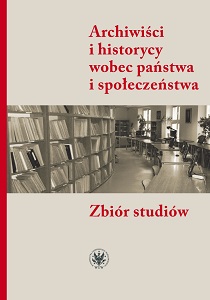Rozważania Kazimierza Konarskiego o historii, państwie i społeczeństwie
Kazimierz Konarski on History, State and Society
Author(s): Alicja Kulecka
Subject(s): 19th Century, Pre-WW I & WW I (1900 -1919), Interwar Period (1920 - 1939), WW II and following years (1940 - 1949), Post-War period (1950 - 1989), Transformation Period (1990 - 2010)
Published by: Wydawnictwa Uniwersytetu Warszawskiego
Keywords: Kazimierz Konarski; war; archives; history; happiness; state; society
Summary/Abstract: The article aims to present K. Konarski’s views on history, state and society. It is also an attempt to broaden studies on archivists’ biographies through showing their social views and relationships with their environment. It corresponds with the thesis expressed by the author of the article. There are many factors crucial for the publication of Konarski’s memoirs: one of them was his intention to recount his own experiences during the Second World War and preserve the memory of the deeds performed by his family, the archivist community, the people of Warsaw and the conspiracy organisations operating in the city. As Konarski’s memoirs have many threads, it is extremely difficult to put them in the hierarchical order. Konarski used many forms when talking about the past. He appreciated literary narrative in history, which enabled him to access many more readers, especially children and the youth. These two groups are important addressees of his works: he considered communicating with them a key element of historian and archivist’s activity. A literary narrative was a valuable form of promoting knowledge of the archives’ resources. Konarski’s memoirs are a major source of understanding his personality and values: he appreciated work and tried to be optimistic in life. His war experiences enabled him to show any war as a factor destroying people, social relationships, belief in what is right and trust in other people. In his memoirs he treated all social groups, not only the elite of the society, with respect. His ethical and academic decisions relied on the values grounded on the reflections about the past and the reverence for Polish cultural heritage.
Book: Archiwiści i historycy wobec państwa i społeczeństwa. Zbiór studiów
- Page Range: 85-122
- Page Count: 38
- Publication Year: 2020
- Language: Polish
- Content File-PDF

